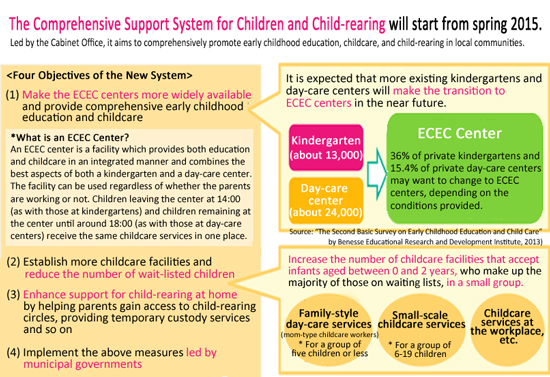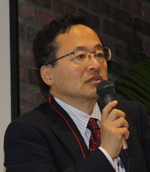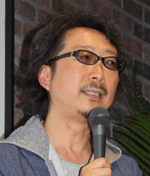The Comprehensive Support System for Children and Child-rearing ("new child support system") will start from spring 2015 in Japan. It is expected that the issue of long waiting lists for childcare facilities in metropolitan areas will be effectively dealt with. In this report, Professor Takashi Muto and Professor Hirotomo Omameuda discuss the potential impact of the new child support system on families and childcare facilities.
1. Social Background Relating to the New Child Support System (Benesse Educational Research & Development Institute)
The current social environment that makes child-rearing difficult is said to be one of the reasons behind the declining birth rate in Japan. More precisely, the quality and quantity of childcare are both inadequate: for example, there is a shortage of childcare workers (quality) and there is the issue of long waiting lists for childcare facilities (quantity). Under such circumstances, the government decided to introduce a new child support system, aiming to ensure that all families will feel supported and will enjoy their child-rearing.
The new system aims to promote the following four measures:
- Make sure that the Early Childhood Education and Care center (ECEC center: nintei kodomo en) is more widely available. The ECEC center combines the advantages of both kindergartens and day-care centers
- Establish a greater number of childcare facilities and reduce the number of wait-listed children
- Improve the quality of early childhood education and enhance child-rearing support services
- Implement the above measures according to the circumstances of each local community

* Compiled and redesigned by Benesse Educational Research and Development Institute based on "The Comprehensive Support System for Children and Child-rearing
Information Booklet."
2. The Effects of the New Child Support System
(1) Effects on Childcare, Early Childhood Education, and Child-rearing (Takashi Muto)
-Parents will have a choice of where to send their children
The new child support system is designed to have a five-year period starting from 2015. Under the system, the number of childcare facilities will increase and the number of wait-listed children will decrease to almost zero within the five-year period. The system also aims to promote the ECEC center, which is one of the core measures and which will become the mainstream of childcare systems in the future.
When the issue of long waiting lists for childcare facilities is resolved, parents will have a choice of where to send their children. Eventually, parents may seek a better quality of childcare services (e.g. the content of child education) as well as the convenience of facilities (close location to their home, lunch provided every day, etc.). In response to this, childcare facilities will need to offer specific services to attract parents, such as the introduction of a new education curriculum which will benefit children when they start elementary school. It is also expected that more childcare facilities will make use of third-party evaluations to objectively quantify the quality of their services. Regardless of the kind of move which the facilities make, this will impose a higher requirement of accountability on childcare facilities on behalf of parents.
-Child-rearing support is another core value of the new system
The measure to resolve the issue of long waiting lists for childcare facilities is likely to draw more attention to the new child support system, as a means of supporting double income families. However, there is another core value of the system that promotes child-rearing support services. Consequently, the number of child-rearing circles will increase among parents who are bringing up children aged between zero and two years. The new child support system requires the ECEC centers to establish a community childcare support center; therefore, the more the support centers are provided, the more chance parents will find child-rearing circles.
(2) Effects on Families (Hirotomo Omameuda)
-The working style of parents
If the number of wait-listed children decreases after the introduction of the new child support system, it is likely that the number of double income families will increase. At the same time, more parents will use childcare services for younger infants/long hours, as they will be able to find the facilities more easily. Therefore, it is necessary to consider the working style of parents, although this is not actually covered by the new child support system.
In the past, working parents tended to choose day-care centers while non-working parents tended to choose kindergartens. If the new child support system allows parents to have a choice of where to send their children, all types of childcare facilities including public and private kindergartens, day-care centers, and the ECEC centers might face a kind of market competition, as they will all be players in the same game.
According to surveys by municipal governments in the metropolitan areas, more parents are thinking about the option of ECEC centers. Conventional day-care centers are becoming less attractive as a facility of early childhood education, although they do have educational functions. Therefore, it is expected that more day-care centers will make the transition to ECEC centers.
-People and places for child-rearing consultation services
One of the important issues for child-rearing support is the transition from preschool to elementary school. More parents are becoming serious about school education for their children and are considering the option of early childhood education for children aged five.
I believe that it will become more important for kindergartens, day-care centers and the ECEC centers to establish closer communication with families. Any childcare facility which I found has quality childcare, always maintains good and close communication with parents. Although the actual condition and outcome of their services are not visible and measurable, they provide valuable education for children. Therefore, it will become more important for them to disseminate information in order to make unclear factors more visible. They should try to get parents involved in activities and make them fond of the facilities.
Another issue is to provide support for parents. The new child support system introduces a range of child-rearing support services, with the aim of "bringing up" the parents themselves. Therefore, it is necessary to provide people and places that can offer child-rearing consultation for parents not only about their children but also about themselves.
3. Q & A
Q: I agree that the new child support system is beneficial for parents. But is it beneficial for children as well? In particular, are there any measures for children with special needs?
A (Prof. Muto): The new child support system aims to improve the quality of childcare services, which will definitely be beneficial for children. In addition, the system aims to provide training and better working conditions for childcare staff, which, as a result, will positively affect the childcare services and education. The government has also allocated more budget resources to childcare services for children with special needs, and requested that no childcare facilities will reject these children.
Q: I heard that the government will start revising the Course of Study for Kindergarten and the National Guidelines for Care and Education at Day Nursery from the autumn of 2014. What are the main points of these revisions?
A (Prof. Muto): Both of the revisions will be implemented at the same time. The main points of these revisions are (1) to minimize the gap between kindergartens and day-care centers; (2) to facilitate the transition from preschool to elementary school, and examine the treatment of early childhood education for children aged five (this has already been briefly mentioned in the Guidelines for Education and Childcare at the ECEC Centers); and (3) to examine the relationship between children who are not yet attending childcare facilities and their families. Furthermore, the Courses of Study for Elementary School will be revised at the same time. I assume that these guidelines and policies will include the role models of kindergartens, day-care centers, and the ECEC centers within a comprehensive educational framework for children aged between 0 and 18 years old.



 Takashi Muto
Takashi Muto Hirotomo Omameuda
Hirotomo Omameuda










